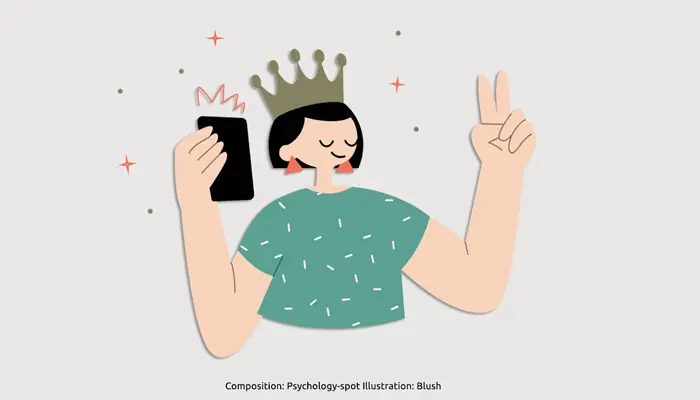
In life, we sometimes have to deal with people full of themselves. These are deeply self-centered people who consume our resources and mental energy. Dealing with them is often exhausting. The conversation quickly turns into a monologue that revolves around the other. When we finally say goodbye, we can’t help but feel like we’ve walked through the desert.
5 reasons why self-filled people are exhausting
1. Their problems are always more serious than yours
Self-filled people often develop a very self-centered outlook. That means they find it difficult to put themselves in the shoes of the others and understand their problems or empathize with their suffering.
Therefore, if we tell them about our problems, they will immediately bring up their rosary of difficulties. In this way they move the focus from us to themselves to become the center of attention.
If we tell them about a delicate situation, instead of finding validation, our words will bounce back to us amplified. If we tell them that we have been ill, their illness will be more serious. If we have just broken up with a partner, they will bring up their terrible breakups. And if we tell them about a project that excites us, theirs will be bigger and more interesting.
When we interact with people who are full of themselves, we can have the feeling that life is a continuous competition. This need to compare joys and anguish is exhausting, especially at times when we feel particularly vulnerable.
2. They are immune to subtle signals that you are not interested in a topic
Self-filled people believe that the others are made in their image and likeness. Therefore, they assume that what interests them, also interests the others. They make the mistake of thinking that the others share their values and way of seeing life.
They are victims of the false consensus effect, in such a way that they overestimate the degree to which other people share their ideas, attitudes and behaviors. They think that their habits, preferences and opinions are shared by the vast majority.
This prevents them from noticing the signals of disinterest sent by their interlocutor, which usually leads them to develop lengthy monologues that end up exhausting us. The problem is that, when we have to pay attention to something that does not interest us, our brain has to work much harder to follow the story line and pick up the details. That is why we end up more mentally exhausted after talking with these types of people.
3. They are extremely susceptible to criticism
Nobody likes to make mistakes and receive criticism for it. But most people are mature enough to accept those criticisms and try to improve or correct their mistake. However, people full of themselves respond differently.
These people view criticism as a personal attack, take it too seriously, and overreact. They are immediately offended and get defensive, an attitude that ends up burning the bridges to any possible understanding.
This extreme susceptibility complicates the relationships because we are forced to continually tread on our feet. We feel as if we are walking on glass, with a continuous sense of tension or urgency. We are forced to measure the impact of each of our words and keep many things silent, which ends up being exhausting.
4. They force you to walk on an emotional tightrope
Self-filled people are extremely imbued with their world, feelings, problems and projects, so that the relationships they establish with the others are often inconsistent. Connecting with them is like walking on a tightrope.
They maintain constant communication when they are very excited about a project or when they have a problem and need our help, but then they are not available to return the favor or they simply disappear, because they have found support in another person. At their side, we can feel on an emotional roller coaster, far from the necessary emotional stability that we all need.▷
With these people it is difficult to keep the feet on the ground, so it is also impossible to maintain a more intimate and satisfying relationship. Their inability to commit long-term often leads to liquid relationships characterized by fragile emotional ties.
5. They demand preferential treatment
Although people full of themselves are not very empathetic and find it difficult to provide emotional validation, they often demand preferential treatment. They tend to think that they are above the others and that the others have an obligation to listen to them and prioritize their needs and problems.
These people suffer from a self-centered bias that leads them to believe that the world revolves around them. As psychologists of Tohoku Women’s Junior College found, tend to classify the other people’s behaviors as unfair and their own behaviors as more fair. They attribute to themselves successes and positive behaviors while projecting failures and negative behaviors onto the others.
Sometimes they can even present Machiavellian features since, in order to receive preferential treatment, they can practice manipulative behaviors. The fact that we have to continually put up barriers to defend our rights ends up being exhausting in the long run.
Recognizing the self-centeredness
A little self-centeredness is not negative. We all need to think about ourselves and, in certain circumstances, even prioritize ourselves. However, when that becomes a pattern and we feel the urgent need to be the focus of attention, we have a problem that we must solve as soon as possible.
Detecting that we are too full of ourselves is not usually easy because self-centeredness is like a wall that hinders our capacity for introspection. However, sometimes it is enough to honestly answer a question: How much have we learned and discovered of the person we were talking to?
If we can’t say much about that person and that pattern repeats, we have probably monopolized the conversation. And that could mean that we have talked too much and are too full of ourselves. In that case, we should consider doing more active listening. Talk less and listen twice.
How to help the persons full of themselves?
People full of themselves are not usually happy. This egocentricity is not the expression of a rich inner life, but rather of numerous deficiencies that they try to compensate by projecting a false self-confidence and an artificially high self-esteem.
To help these people, we can make them notice their behavior, trying not to perceive it as destructive criticism but by encouraging them to assume a more reflective attitude in the face of the exhausting relationship dynamics that they generate.
For example, if we are talking about a problem that worries us, we can ask them to focus on that situation instead of shifting the focus of attention to themselves. We could say: “I understand that you have had a bad time, but I need your help, that you listen to me now”.
When we are not interested in a topic, instead of sending subtle signals, we could be more direct. Saying “I’m sorry, that topic doesn’t interest me” or “I’m sorry, I don’t have time to talk about that topic right now” could be enough.
The key is to make them notice, in a friendly but direct way, that this relational pattern that are trying to impose is exhausting and unacceptable. Of course, these people won’t change overnight, but if we persist in defending our assertive rights, those attempts could pay off, leading to a more rewarding relationship of mutual respect and understanding.
Source:
Tanaka, K. (1993) Egocentric bias in perceived fairness: Is it observed in Japan? Social Justice Research; 6 (3): 273–285.



